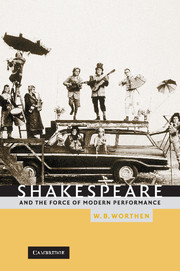2 - Globe performativity
Published online by Cambridge University Press: 22 September 2009
Summary
Fakin was your Daddys callin but diggin was his livelihood.
Suzan-Lori Parks, The America Play (181)Onstage Shakespearean drama foregrounds the edgy historicity of the classic theatre, though this dimension of dramatic performativity is hardly confined to plays of the past: the place of theatre in the space of history is imagined today nowhere more brilliantly than in Suzan-Lori Parks's The America Play. The play opens in “A great hole. In the middle of nowhere. The hole is an exact replica of the Great Hole of History” (America Play 159). The main character, The Foundling Father (a former gravedigger, otherwise known as The Lesser Known) describes how he traveled west, and built this replica of “the Great Hole,” an eastern “theme park. With historical parades … The Hole and its Historicity and the part he played in it all gave a shape to the life and posterity of the Lesser Known that he could never shake” (162). Later in the play we find that “Amerigo Vespucci hisself made regular appearances” in the Great Hole of History, as well as “Marcus Garvey. Ferdinand and Isabella. Mary Queen of thuh Scots! Tarzan King of thuh Apes! Washington Jefferson Harding and Millard Fillmore. Mistufer Columbus even. Oh they saw all thuh greats” (180). The Foundling Father – played by an African-American actor – “bore a strong resemblance to Abraham Lincoln” – “He was tall and thinly built just like the Great Man.
- Type
- Chapter
- Information
- Shakespeare and the Force of Modern Performance , pp. 79 - 116Publisher: Cambridge University PressPrint publication year: 2003
- 2
- Cited by



